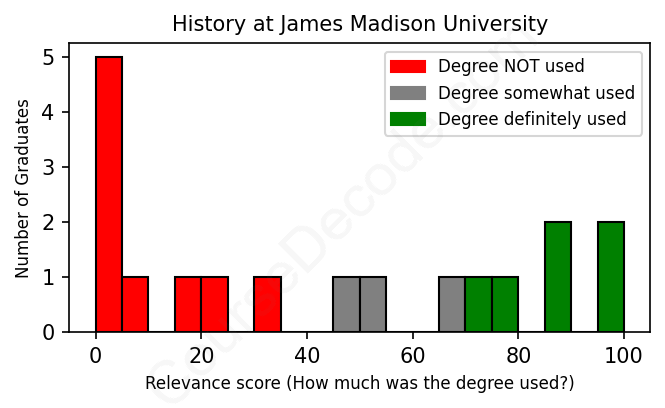
First, some facts. Of the History graduates from James Madison University we've analyzed , here's how many have used (or NOT used) their degree in their career:

These are estimates based on AI analysis of 18 LinkedIn profiles (see below).
The verdict? Bad. Overall, with an average relevance score of 42%, History graduates from James Madison University have a substantially lower likelihood (-25%) of finding work in this field compared to the average graduate across all fields:
And for comparison, here's the chart for all profiles we've looked at across all degrees.
Also, after graduating, 61% of these graduates have pursued further education other than another Bachelor's degree (such as a Masters degree or other), compared to the average across all profiles of 35%. This suggests you may need more than just a Bachelors degree to be competitive as a History graduate.
See the details:
|
Relevance score: 100% We think this person has gone into a career highly relevant to their degree. We think this person has gone into a career highly relevant to their degree.
DEGREE INFOGraduated in 2014 from James Madison University with a Bachelor of Arts (B.A.) in History. No other secondary education since. JOB HISTORY SINCE GRADUATIONIntern The Lisanby Museum Jan 2014 - May 2014 ABOUTBlends research and writing skills acquired while attending James Madison University, with management and customer service experience post graduation. Proficient in Microsoft Office, Point of Sale, UPS Worldship, and Adobe In-Design. Conversational in Spanish. Synthesizes this particular combination to provide employers with proven communication, leadership, and organization skills. |
The top 10 most common jobs done by the graduates we've analyzed (ranked most common to least) are:
Here is a visual representation of the most common words in job titles for History graduates (this is across all History graduates we've analyzed, not just those who went to James Madison University):

Graduates from James Madison University who studied History seem to have a pretty diverse array of career paths after they leave school. A common starting point for many is into education—it's not unusual to see them landing roles as teachers or teacher assistants right out of college. This is especially true for those who graduated around 2010-2015, as several have moved on to positions in public schools teaching social studies or special education. This trend continues, showing that many of these graduates are passionate about education and making a positive impact in classrooms.
However, as we look a bit further down the line—around five to ten years post-graduation—the trends start to diverge. While some continue their journey in education as department chairs or stay connected to academia, others seem to shift into various fields that aren’t overtly related to History. For example, we've got several graduates venturing into sales, marketing, and project management roles, which may reflect a broader job market trend of recent years where liberal arts graduates leverage their skills in diverse business contexts. This suggests a mix of success and adaptability; while not everyone stays in history-specific roles, many do find fulfilling careers in areas where they're able to apply critical thinking and communication skills learned during their studies. Overall, it looks like graduates are doing a mix of old-school history roles and new-age jobs, showcasing the versatility of a History degree from JMU.
Getting a Bachelor’s degree in History, whether at James Madison University or elsewhere, can be a mixed bag in terms of difficulty. It definitely requires a good amount of reading, writing, and critical thinking, since you'll dive deep into different periods, cultures, and events. If you enjoy storytelling and connecting the dots between historical events, it can feel more engaging than tough. But be prepared for those research papers and discussions that might challenge you to think critically about what you've learned. On average, it might be a bit less intense than some other majors like engineering or the sciences, but it still demands dedication and a genuine interest in the subject. So, if you love history and are willing to put in the effort, it can be a rewarding journey!
Most commonly, in the LinkedIn profiles we've looked at, it takes people 4 years to finish a Bachelor degree in History.
So, looking at these James Madison University grads, it seems like most of them are doing okay financially, but it really varies. A lot of the history majors have opted for teaching positions, which can be stable and fulfilling, but often don’t pay super well—especially in those early years. On the other hand, some graduates have landed roles in companies like Verizon, Penguin Random House, and government organizations, which probably bring in better salaries over time. There’s also a mix of roles in marketing and administration that might offer decent pay if they stick around in those fields. Overall, while it seems like some are making a decent living, especially with growth into administrative roles or specialized positions, others are definitely on the lower end of the pay scale, particularly in education.
Here is a visual representation of the most common words seen in the "about" section of LinkedIn profiles who have a Bachelor degree in History (this is across all History graduates we've analyzed, not just those who went to James Madison University). This may or may not be useful:

Here are all colleges offering a Bachelor degree in History (ordered by the average relevance score of their History graduates, best to worst) where we have analyzed at least 10 of their graduates: